

SUBSCRIBE TO OUR FREE NEWSLETTER
Daily news & progressive opinion—funded by the people, not the corporations—delivered straight to your inbox.
5
#000000
#FFFFFF
To donate by check, phone, or other method, see our More Ways to Give page.


Daily news & progressive opinion—funded by the people, not the corporations—delivered straight to your inbox.
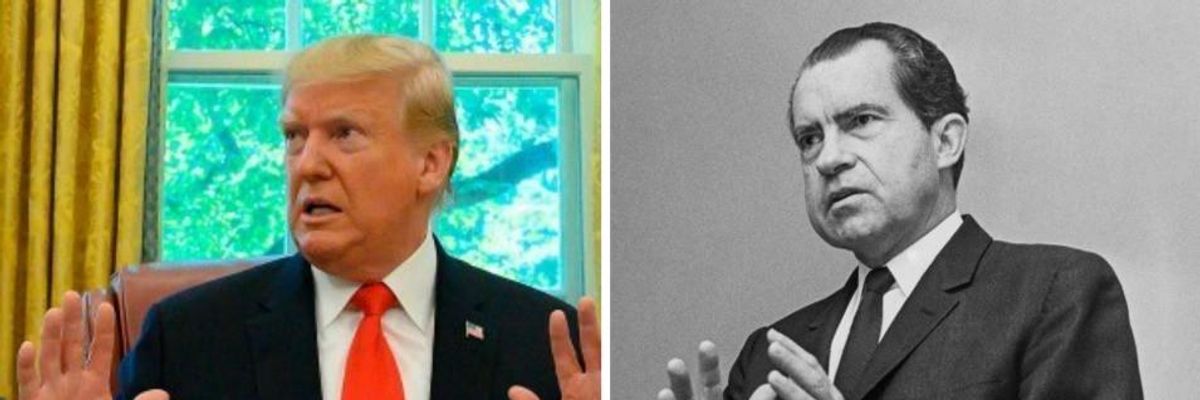
In a racially coded and distinctly nationalist fashion, Nixon brought southern whites in the formerly Democratic bastions of the South definitively into the Republican fold. (Photo: Jim Watson/AFP/Getty Images and CQ Roll Call via Getty Images)
It was summer almost half a century ago when I got into that Volkswagen van and began my trip across country with Peter, a photographer friend. I was officially doing so as a reporter for a small San Francisco news service, having been sent out to tap the mood of the nation in a politically fraught moment. The Vietnam War, with all its domestic protests and disturbances, was just ending. North Vietnamese troops would soon enough enter Saigon, the South Vietnamese capital; the president of the United States, Richard Nixon, was then trapped in an escalating scandal called "Watergate."
And here was the odd thing. I felt trapped, too. In some way, I felt lost. As I put it then (and this should have a familiar ring to it, even if, in 1973, I was only referring to the TV version of the news), "That screen haunted my life. Somehow I wanted to shatter it and discover new, more human reference points, a true center of gravity." I had the urge to break out of that world of mine and do the all-American thing, the Jack Kerouac thing: go "on the road."
So Peter and I set out on that famed American road, traveling from campgrounds to fast-food restaurants, carnival midways to Old Faithful, only to find ourselves trapped in what I called "the increasing corporate control not just of people on the job, but on their vacations, in their leisure hours." I found myself interviewing, and him photographing, what I came to think of as a "population of disoriented nomads"--mostly lower-middle-class and working-class Americans, confused and angry, "pushed aside," as I wrote then, by "forces they feel are beyond their control." We were, it turned out, on someone else's road entirely.
In Milwaukee, we would be joined by Nancy, who later became my wife, and then would spend weeks following those all-too-unromantic highways (without a Jack Kerouac in sight), interviewing anyone who would talk to us. In the end, that attempt of a 29-year-old to break free from his own life, to figure out "where (or whether) I fit into American society" became my first book, Beyond Our Control: America in the Mid Seventies. In retrospect, that book about our strange journey into a country being reorganized for eternal consumption and the wellbeing of giant corporations became my own--as I would then call it--"dream-document excavated from our recent past."
And yes, even so long ago, it was already a troubled moment in a troubled land. I must admit, though, that I hadn't looked at Beyond Our Control in years, not until a friend recently found a copy, read it, and emailed, quoting my own ancient text back to me to point out how eerily relevant it still was, how--in a sense--Trumpian parts of that 1973 America already were.
He highlighted, in particular, an interview near the end of that book with "Frank Nelson"--I changed all the names, so who knows now what his real one was--about which more in a moment. That missive startled me. I had forgotten all those Frank Nelsons and perhaps as well the Tom Engelhardt who interviewed them so long ago.
So, curious about that long-lost self of mine and the world I then inhabited, I picked up that old book and reread it in order to meet the young Tom Engelhardt on the road in another American universe. And how strange that journey back into my own--and our--past proved to be.
The Right Wind Sweeping In Off the Plain
So, if you have the patience for a little time travel, return with me to July 1973 and let me tell you about Frank Nelson, whom I met at a trailhead in Yellowstone National Park with his wife and three children. He was "a responsible, likeable family man" with--regardless of how hard I pressed him--"no vision of a better future." A plumber and union shop steward from Cleveland, as well as the chairman of the union bargaining committee in his factory, he proudly told me: "I have really dedicated myself to the labor movement all my life and I believe in it."
Yet he was already talking back then about the growing "conservative approach" of the trade union movement and the possibility that it would be destroyed, he believed, by "the race issue." He was clearly both anti-Semitic and racist. ("Being white, I would prefer the continued supremacy of the white race instead of this homogenization that's coming.") And while discussing what he felt was a growing American crisis with me, he also told me that "your liberals believe in one world government... and your conservatives"--which he clearly believed himself to be--"believe in America first, American domination."
And remember, this was July 1973, not July 2019. It was Richard Nixon's America, not Donald Trump's.
Frank and his wife Helen were open, chatty, and so pleased with the interview experience that she gave me their address and asked me to send them a copy of anything I wrote. In other words, he said nothing he felt was out of the range of propriety. My reaction, on leaving him, was: "For me, this interview seemed like the crescendo towards which the bits and pieces of our trip have been building."
As I had discovered in those weeks of interviewing, Nelson, like so many others on that vacation loop, was filled to the brim with half-spoken and unspoken fears about a future in which, as I put it then, "the [corporate] pushers will survive, maybe even profit. It's these people we've talked with, the vast mass of middle people who have barely eked out a toehold in the system, who will be cut off at the knees. And, being hooked [on that system], they don't know what to do."
Then, thinking about Nelson (and others like him we had met), I added,
"The next step for Frank Nelson, however, may be out of this passivity and into the streets... The motivation, the frustration, the anger is there. Even a new ideology, the ideology of race and nationalism is emerging. All that's missing is the right wind sweeping in off the plain, a combination of forces at the top of the society willing to mobilize Frank Nelson.
"...Sinking people don't usually have a trenchant analysis of reality. All they require is the promise that their hard-won sense of status will not go down the drain; and an explanation, any explanation, on which to hang their hopes. American society leaves people so confused and reality so disjointed that almost any formula which pretends to put the pieces together and appeals to what people think of as their self-interest may prove acceptable."
In those pages, I had already brought up Weimar-era Germany--the moment, that is, before Hitler rose to power--and then I added:
"In Germany in the thirties, the formula that worked was anti-Semitism, anti-communism, and a rabid nationalism combined with full employment and a return to domestic stability. If Frank Nelson's any criterion, the formula may not be that much different here... Nationalism could well be the banner under which the struggle and the inevitable sacrifices will come, and race the bogeyman just as Jews were in Germany. The identifiable (Black) poor are the symbol for Frank Nelson of what he has to lose, what could be ripped out of his hands. And he'll defend himself against that even if he has to ally himself with 'the Jews and rich Gentiles' to do it.
"Frank Nelson and millions of other Americans are set up for the picking, if a group at the top sees profit in the crop."
Welcome to a More Extreme World
In the age of Donald Trump, the Proud Boys, and the Wolverine Watchmen, much of this should feel strangely familiar. If, however, my reporting was in any way prophetic, I have to admit that I didn't realize it all these years--not until my friend wrote me. Still, it should be obvious, in retrospect, that, bizarre as the present moment may seem, it didn't come out of the blue, not faintly. How could it have?
For that matter, Donald Trump didn't exactly arrive out of the blue either. As a start, just a couple of months after I got back to San Francisco from that cross-country jaunt of ours, he made his first appearance on the front page of the New York Times. He was 27, two years younger than me, and already the president of the Trump Management Corporation. The headline, shades of the future Donald and the white nationalism that's accompanied him, was: "Major Landlord Accused of Antiblack Bias in City." The Justice Department was then charging his father Fred and him with refusing "to rent or negotiate rentals 'because of race and color'" in the buildings they then owned and managed. And his first words quoted in that paper about those charges were, appropriately enough: "They are absolutely ridiculous... We never have discriminated and we never would." Of course not! And what hasn't been increasingly, ridiculously Trumpian about our all-American world ever since?
When you think about it, with that moment in 1973 in mind, Trump himself might be reimagined as some extreme combination of Richard Nixon (a man with his own revealing tapes just like The Donald) and George Wallace. The racist governor of Alabama and a third party candidate the year Nixon slipped by Democrat Hubert Humphrey to first win the White House, Wallace was a man best known for the formulation "segregation now, segregation tomorrow, segregation forever."
Nixon took the presidency in 1968 and again in 1972 with his own form of racism, the "southern strategy," first pioneered by Republican presidential candidate Barry Goldwater in 1964 (and then called, far more redolently, "Operation Dixie"). In a racially coded and distinctly nationalist fashion, Nixon brought southern whites in the formerly Democratic bastions of the South definitively into the Republican fold. By 1980, Ronald Reagan wouldn't think twice about launching his own presidential election campaign with a "states' rights" speech (then still a code phrase for segregation) near Philadelphia, Mississippi, just miles from the earthen dam where three murdered civil rights workers had been found buried in 1964. And in the intervening years, the Republican Party, too, has gone south (so to speak) big time and into a form of illiberality that was, even in the Nixon era, striking enough.
By 2016, of course, that southern strategy had become something more like a national strategy in the (pussy-grabbing) hands of Donald Trump.
Meanwhile, the corporatization--I might, then, have thought of it as the fast-foodization--of the country that Peter, Nancy, and I were traveling across was already well underway. At the same time, a new kind of all-American inequality was, in those years, just beginning to make itself felt. Today, with the first billionaire in the White House and other billionaires, even in the midst of a pandemic, continuing to make an absolute mint while so many Americans suffer, the inequality that left Frank Nelson and his peers so desperately uneasy has never stopped rising to truly staggering levels.
Believe me, even if Donald Trump has to leave the Oval Office on January 20, 2021, we'll still be in his America. And 47 years after my long, strange trip, I think I can guarantee you one thing: if it weren't for the pandemic that has this country in its grasp and has swept so many of us off any path whatsoever, some young reporter, stir crazy and unhappy, would still be able to head out onto a twenty-first-century "road" and find updated versions of Frank Nelson galore (a surprising number of whom might be well-armed and angry).
Welcome to America! There's no question that, so long after Peter, Nancy, and I travelled that not-so-open road, our lives and this country are way beyond our control.
Writing about the people I had interviewed then (about whom--with the single inspirational exception of a museum director I met in Twin Falls, Idaho--I knew nothing more), I said: "I don't doubt that they, like me, are still heading reluctantly toward a future that will make the summer of 1973 seem truly unreal and leave us all wondering: Could life ever have really been that way?"
In Covid-19 America, with the West Coast still burning, Colorado in historic flames, a record 11 storms hitting the Gulf Coast and elsewhere this hurricane season, and heat of every sort rising everywhere, don't for a second believe that the phrase "beyond our control" couldn't gain new meaning in the decades to come.
Welcome to a more extreme version of the world Frank Nelson and I already inhabited in 1973.
Trump and Musk are on an unconstitutional rampage, aiming for virtually every corner of the federal government. These two right-wing billionaires are targeting nurses, scientists, teachers, daycare providers, judges, veterans, air traffic controllers, and nuclear safety inspectors. No one is safe. The food stamps program, Social Security, Medicare, and Medicaid are next. It’s an unprecedented disaster and a five-alarm fire, but there will be a reckoning. The people did not vote for this. The American people do not want this dystopian hellscape that hides behind claims of “efficiency.” Still, in reality, it is all a giveaway to corporate interests and the libertarian dreams of far-right oligarchs like Musk. Common Dreams is playing a vital role by reporting day and night on this orgy of corruption and greed, as well as what everyday people can do to organize and fight back. As a people-powered nonprofit news outlet, we cover issues the corporate media never will, but we can only continue with our readers’ support. |
It was summer almost half a century ago when I got into that Volkswagen van and began my trip across country with Peter, a photographer friend. I was officially doing so as a reporter for a small San Francisco news service, having been sent out to tap the mood of the nation in a politically fraught moment. The Vietnam War, with all its domestic protests and disturbances, was just ending. North Vietnamese troops would soon enough enter Saigon, the South Vietnamese capital; the president of the United States, Richard Nixon, was then trapped in an escalating scandal called "Watergate."
And here was the odd thing. I felt trapped, too. In some way, I felt lost. As I put it then (and this should have a familiar ring to it, even if, in 1973, I was only referring to the TV version of the news), "That screen haunted my life. Somehow I wanted to shatter it and discover new, more human reference points, a true center of gravity." I had the urge to break out of that world of mine and do the all-American thing, the Jack Kerouac thing: go "on the road."
So Peter and I set out on that famed American road, traveling from campgrounds to fast-food restaurants, carnival midways to Old Faithful, only to find ourselves trapped in what I called "the increasing corporate control not just of people on the job, but on their vacations, in their leisure hours." I found myself interviewing, and him photographing, what I came to think of as a "population of disoriented nomads"--mostly lower-middle-class and working-class Americans, confused and angry, "pushed aside," as I wrote then, by "forces they feel are beyond their control." We were, it turned out, on someone else's road entirely.
In Milwaukee, we would be joined by Nancy, who later became my wife, and then would spend weeks following those all-too-unromantic highways (without a Jack Kerouac in sight), interviewing anyone who would talk to us. In the end, that attempt of a 29-year-old to break free from his own life, to figure out "where (or whether) I fit into American society" became my first book, Beyond Our Control: America in the Mid Seventies. In retrospect, that book about our strange journey into a country being reorganized for eternal consumption and the wellbeing of giant corporations became my own--as I would then call it--"dream-document excavated from our recent past."
And yes, even so long ago, it was already a troubled moment in a troubled land. I must admit, though, that I hadn't looked at Beyond Our Control in years, not until a friend recently found a copy, read it, and emailed, quoting my own ancient text back to me to point out how eerily relevant it still was, how--in a sense--Trumpian parts of that 1973 America already were.
He highlighted, in particular, an interview near the end of that book with "Frank Nelson"--I changed all the names, so who knows now what his real one was--about which more in a moment. That missive startled me. I had forgotten all those Frank Nelsons and perhaps as well the Tom Engelhardt who interviewed them so long ago.
So, curious about that long-lost self of mine and the world I then inhabited, I picked up that old book and reread it in order to meet the young Tom Engelhardt on the road in another American universe. And how strange that journey back into my own--and our--past proved to be.
The Right Wind Sweeping In Off the Plain
So, if you have the patience for a little time travel, return with me to July 1973 and let me tell you about Frank Nelson, whom I met at a trailhead in Yellowstone National Park with his wife and three children. He was "a responsible, likeable family man" with--regardless of how hard I pressed him--"no vision of a better future." A plumber and union shop steward from Cleveland, as well as the chairman of the union bargaining committee in his factory, he proudly told me: "I have really dedicated myself to the labor movement all my life and I believe in it."
Yet he was already talking back then about the growing "conservative approach" of the trade union movement and the possibility that it would be destroyed, he believed, by "the race issue." He was clearly both anti-Semitic and racist. ("Being white, I would prefer the continued supremacy of the white race instead of this homogenization that's coming.") And while discussing what he felt was a growing American crisis with me, he also told me that "your liberals believe in one world government... and your conservatives"--which he clearly believed himself to be--"believe in America first, American domination."
And remember, this was July 1973, not July 2019. It was Richard Nixon's America, not Donald Trump's.
Frank and his wife Helen were open, chatty, and so pleased with the interview experience that she gave me their address and asked me to send them a copy of anything I wrote. In other words, he said nothing he felt was out of the range of propriety. My reaction, on leaving him, was: "For me, this interview seemed like the crescendo towards which the bits and pieces of our trip have been building."
As I had discovered in those weeks of interviewing, Nelson, like so many others on that vacation loop, was filled to the brim with half-spoken and unspoken fears about a future in which, as I put it then, "the [corporate] pushers will survive, maybe even profit. It's these people we've talked with, the vast mass of middle people who have barely eked out a toehold in the system, who will be cut off at the knees. And, being hooked [on that system], they don't know what to do."
Then, thinking about Nelson (and others like him we had met), I added,
"The next step for Frank Nelson, however, may be out of this passivity and into the streets... The motivation, the frustration, the anger is there. Even a new ideology, the ideology of race and nationalism is emerging. All that's missing is the right wind sweeping in off the plain, a combination of forces at the top of the society willing to mobilize Frank Nelson.
"...Sinking people don't usually have a trenchant analysis of reality. All they require is the promise that their hard-won sense of status will not go down the drain; and an explanation, any explanation, on which to hang their hopes. American society leaves people so confused and reality so disjointed that almost any formula which pretends to put the pieces together and appeals to what people think of as their self-interest may prove acceptable."
In those pages, I had already brought up Weimar-era Germany--the moment, that is, before Hitler rose to power--and then I added:
"In Germany in the thirties, the formula that worked was anti-Semitism, anti-communism, and a rabid nationalism combined with full employment and a return to domestic stability. If Frank Nelson's any criterion, the formula may not be that much different here... Nationalism could well be the banner under which the struggle and the inevitable sacrifices will come, and race the bogeyman just as Jews were in Germany. The identifiable (Black) poor are the symbol for Frank Nelson of what he has to lose, what could be ripped out of his hands. And he'll defend himself against that even if he has to ally himself with 'the Jews and rich Gentiles' to do it.
"Frank Nelson and millions of other Americans are set up for the picking, if a group at the top sees profit in the crop."
Welcome to a More Extreme World
In the age of Donald Trump, the Proud Boys, and the Wolverine Watchmen, much of this should feel strangely familiar. If, however, my reporting was in any way prophetic, I have to admit that I didn't realize it all these years--not until my friend wrote me. Still, it should be obvious, in retrospect, that, bizarre as the present moment may seem, it didn't come out of the blue, not faintly. How could it have?
For that matter, Donald Trump didn't exactly arrive out of the blue either. As a start, just a couple of months after I got back to San Francisco from that cross-country jaunt of ours, he made his first appearance on the front page of the New York Times. He was 27, two years younger than me, and already the president of the Trump Management Corporation. The headline, shades of the future Donald and the white nationalism that's accompanied him, was: "Major Landlord Accused of Antiblack Bias in City." The Justice Department was then charging his father Fred and him with refusing "to rent or negotiate rentals 'because of race and color'" in the buildings they then owned and managed. And his first words quoted in that paper about those charges were, appropriately enough: "They are absolutely ridiculous... We never have discriminated and we never would." Of course not! And what hasn't been increasingly, ridiculously Trumpian about our all-American world ever since?
When you think about it, with that moment in 1973 in mind, Trump himself might be reimagined as some extreme combination of Richard Nixon (a man with his own revealing tapes just like The Donald) and George Wallace. The racist governor of Alabama and a third party candidate the year Nixon slipped by Democrat Hubert Humphrey to first win the White House, Wallace was a man best known for the formulation "segregation now, segregation tomorrow, segregation forever."
Nixon took the presidency in 1968 and again in 1972 with his own form of racism, the "southern strategy," first pioneered by Republican presidential candidate Barry Goldwater in 1964 (and then called, far more redolently, "Operation Dixie"). In a racially coded and distinctly nationalist fashion, Nixon brought southern whites in the formerly Democratic bastions of the South definitively into the Republican fold. By 1980, Ronald Reagan wouldn't think twice about launching his own presidential election campaign with a "states' rights" speech (then still a code phrase for segregation) near Philadelphia, Mississippi, just miles from the earthen dam where three murdered civil rights workers had been found buried in 1964. And in the intervening years, the Republican Party, too, has gone south (so to speak) big time and into a form of illiberality that was, even in the Nixon era, striking enough.
By 2016, of course, that southern strategy had become something more like a national strategy in the (pussy-grabbing) hands of Donald Trump.
Meanwhile, the corporatization--I might, then, have thought of it as the fast-foodization--of the country that Peter, Nancy, and I were traveling across was already well underway. At the same time, a new kind of all-American inequality was, in those years, just beginning to make itself felt. Today, with the first billionaire in the White House and other billionaires, even in the midst of a pandemic, continuing to make an absolute mint while so many Americans suffer, the inequality that left Frank Nelson and his peers so desperately uneasy has never stopped rising to truly staggering levels.
Believe me, even if Donald Trump has to leave the Oval Office on January 20, 2021, we'll still be in his America. And 47 years after my long, strange trip, I think I can guarantee you one thing: if it weren't for the pandemic that has this country in its grasp and has swept so many of us off any path whatsoever, some young reporter, stir crazy and unhappy, would still be able to head out onto a twenty-first-century "road" and find updated versions of Frank Nelson galore (a surprising number of whom might be well-armed and angry).
Welcome to America! There's no question that, so long after Peter, Nancy, and I travelled that not-so-open road, our lives and this country are way beyond our control.
Writing about the people I had interviewed then (about whom--with the single inspirational exception of a museum director I met in Twin Falls, Idaho--I knew nothing more), I said: "I don't doubt that they, like me, are still heading reluctantly toward a future that will make the summer of 1973 seem truly unreal and leave us all wondering: Could life ever have really been that way?"
In Covid-19 America, with the West Coast still burning, Colorado in historic flames, a record 11 storms hitting the Gulf Coast and elsewhere this hurricane season, and heat of every sort rising everywhere, don't for a second believe that the phrase "beyond our control" couldn't gain new meaning in the decades to come.
Welcome to a more extreme version of the world Frank Nelson and I already inhabited in 1973.
It was summer almost half a century ago when I got into that Volkswagen van and began my trip across country with Peter, a photographer friend. I was officially doing so as a reporter for a small San Francisco news service, having been sent out to tap the mood of the nation in a politically fraught moment. The Vietnam War, with all its domestic protests and disturbances, was just ending. North Vietnamese troops would soon enough enter Saigon, the South Vietnamese capital; the president of the United States, Richard Nixon, was then trapped in an escalating scandal called "Watergate."
And here was the odd thing. I felt trapped, too. In some way, I felt lost. As I put it then (and this should have a familiar ring to it, even if, in 1973, I was only referring to the TV version of the news), "That screen haunted my life. Somehow I wanted to shatter it and discover new, more human reference points, a true center of gravity." I had the urge to break out of that world of mine and do the all-American thing, the Jack Kerouac thing: go "on the road."
So Peter and I set out on that famed American road, traveling from campgrounds to fast-food restaurants, carnival midways to Old Faithful, only to find ourselves trapped in what I called "the increasing corporate control not just of people on the job, but on their vacations, in their leisure hours." I found myself interviewing, and him photographing, what I came to think of as a "population of disoriented nomads"--mostly lower-middle-class and working-class Americans, confused and angry, "pushed aside," as I wrote then, by "forces they feel are beyond their control." We were, it turned out, on someone else's road entirely.
In Milwaukee, we would be joined by Nancy, who later became my wife, and then would spend weeks following those all-too-unromantic highways (without a Jack Kerouac in sight), interviewing anyone who would talk to us. In the end, that attempt of a 29-year-old to break free from his own life, to figure out "where (or whether) I fit into American society" became my first book, Beyond Our Control: America in the Mid Seventies. In retrospect, that book about our strange journey into a country being reorganized for eternal consumption and the wellbeing of giant corporations became my own--as I would then call it--"dream-document excavated from our recent past."
And yes, even so long ago, it was already a troubled moment in a troubled land. I must admit, though, that I hadn't looked at Beyond Our Control in years, not until a friend recently found a copy, read it, and emailed, quoting my own ancient text back to me to point out how eerily relevant it still was, how--in a sense--Trumpian parts of that 1973 America already were.
He highlighted, in particular, an interview near the end of that book with "Frank Nelson"--I changed all the names, so who knows now what his real one was--about which more in a moment. That missive startled me. I had forgotten all those Frank Nelsons and perhaps as well the Tom Engelhardt who interviewed them so long ago.
So, curious about that long-lost self of mine and the world I then inhabited, I picked up that old book and reread it in order to meet the young Tom Engelhardt on the road in another American universe. And how strange that journey back into my own--and our--past proved to be.
The Right Wind Sweeping In Off the Plain
So, if you have the patience for a little time travel, return with me to July 1973 and let me tell you about Frank Nelson, whom I met at a trailhead in Yellowstone National Park with his wife and three children. He was "a responsible, likeable family man" with--regardless of how hard I pressed him--"no vision of a better future." A plumber and union shop steward from Cleveland, as well as the chairman of the union bargaining committee in his factory, he proudly told me: "I have really dedicated myself to the labor movement all my life and I believe in it."
Yet he was already talking back then about the growing "conservative approach" of the trade union movement and the possibility that it would be destroyed, he believed, by "the race issue." He was clearly both anti-Semitic and racist. ("Being white, I would prefer the continued supremacy of the white race instead of this homogenization that's coming.") And while discussing what he felt was a growing American crisis with me, he also told me that "your liberals believe in one world government... and your conservatives"--which he clearly believed himself to be--"believe in America first, American domination."
And remember, this was July 1973, not July 2019. It was Richard Nixon's America, not Donald Trump's.
Frank and his wife Helen were open, chatty, and so pleased with the interview experience that she gave me their address and asked me to send them a copy of anything I wrote. In other words, he said nothing he felt was out of the range of propriety. My reaction, on leaving him, was: "For me, this interview seemed like the crescendo towards which the bits and pieces of our trip have been building."
As I had discovered in those weeks of interviewing, Nelson, like so many others on that vacation loop, was filled to the brim with half-spoken and unspoken fears about a future in which, as I put it then, "the [corporate] pushers will survive, maybe even profit. It's these people we've talked with, the vast mass of middle people who have barely eked out a toehold in the system, who will be cut off at the knees. And, being hooked [on that system], they don't know what to do."
Then, thinking about Nelson (and others like him we had met), I added,
"The next step for Frank Nelson, however, may be out of this passivity and into the streets... The motivation, the frustration, the anger is there. Even a new ideology, the ideology of race and nationalism is emerging. All that's missing is the right wind sweeping in off the plain, a combination of forces at the top of the society willing to mobilize Frank Nelson.
"...Sinking people don't usually have a trenchant analysis of reality. All they require is the promise that their hard-won sense of status will not go down the drain; and an explanation, any explanation, on which to hang their hopes. American society leaves people so confused and reality so disjointed that almost any formula which pretends to put the pieces together and appeals to what people think of as their self-interest may prove acceptable."
In those pages, I had already brought up Weimar-era Germany--the moment, that is, before Hitler rose to power--and then I added:
"In Germany in the thirties, the formula that worked was anti-Semitism, anti-communism, and a rabid nationalism combined with full employment and a return to domestic stability. If Frank Nelson's any criterion, the formula may not be that much different here... Nationalism could well be the banner under which the struggle and the inevitable sacrifices will come, and race the bogeyman just as Jews were in Germany. The identifiable (Black) poor are the symbol for Frank Nelson of what he has to lose, what could be ripped out of his hands. And he'll defend himself against that even if he has to ally himself with 'the Jews and rich Gentiles' to do it.
"Frank Nelson and millions of other Americans are set up for the picking, if a group at the top sees profit in the crop."
Welcome to a More Extreme World
In the age of Donald Trump, the Proud Boys, and the Wolverine Watchmen, much of this should feel strangely familiar. If, however, my reporting was in any way prophetic, I have to admit that I didn't realize it all these years--not until my friend wrote me. Still, it should be obvious, in retrospect, that, bizarre as the present moment may seem, it didn't come out of the blue, not faintly. How could it have?
For that matter, Donald Trump didn't exactly arrive out of the blue either. As a start, just a couple of months after I got back to San Francisco from that cross-country jaunt of ours, he made his first appearance on the front page of the New York Times. He was 27, two years younger than me, and already the president of the Trump Management Corporation. The headline, shades of the future Donald and the white nationalism that's accompanied him, was: "Major Landlord Accused of Antiblack Bias in City." The Justice Department was then charging his father Fred and him with refusing "to rent or negotiate rentals 'because of race and color'" in the buildings they then owned and managed. And his first words quoted in that paper about those charges were, appropriately enough: "They are absolutely ridiculous... We never have discriminated and we never would." Of course not! And what hasn't been increasingly, ridiculously Trumpian about our all-American world ever since?
When you think about it, with that moment in 1973 in mind, Trump himself might be reimagined as some extreme combination of Richard Nixon (a man with his own revealing tapes just like The Donald) and George Wallace. The racist governor of Alabama and a third party candidate the year Nixon slipped by Democrat Hubert Humphrey to first win the White House, Wallace was a man best known for the formulation "segregation now, segregation tomorrow, segregation forever."
Nixon took the presidency in 1968 and again in 1972 with his own form of racism, the "southern strategy," first pioneered by Republican presidential candidate Barry Goldwater in 1964 (and then called, far more redolently, "Operation Dixie"). In a racially coded and distinctly nationalist fashion, Nixon brought southern whites in the formerly Democratic bastions of the South definitively into the Republican fold. By 1980, Ronald Reagan wouldn't think twice about launching his own presidential election campaign with a "states' rights" speech (then still a code phrase for segregation) near Philadelphia, Mississippi, just miles from the earthen dam where three murdered civil rights workers had been found buried in 1964. And in the intervening years, the Republican Party, too, has gone south (so to speak) big time and into a form of illiberality that was, even in the Nixon era, striking enough.
By 2016, of course, that southern strategy had become something more like a national strategy in the (pussy-grabbing) hands of Donald Trump.
Meanwhile, the corporatization--I might, then, have thought of it as the fast-foodization--of the country that Peter, Nancy, and I were traveling across was already well underway. At the same time, a new kind of all-American inequality was, in those years, just beginning to make itself felt. Today, with the first billionaire in the White House and other billionaires, even in the midst of a pandemic, continuing to make an absolute mint while so many Americans suffer, the inequality that left Frank Nelson and his peers so desperately uneasy has never stopped rising to truly staggering levels.
Believe me, even if Donald Trump has to leave the Oval Office on January 20, 2021, we'll still be in his America. And 47 years after my long, strange trip, I think I can guarantee you one thing: if it weren't for the pandemic that has this country in its grasp and has swept so many of us off any path whatsoever, some young reporter, stir crazy and unhappy, would still be able to head out onto a twenty-first-century "road" and find updated versions of Frank Nelson galore (a surprising number of whom might be well-armed and angry).
Welcome to America! There's no question that, so long after Peter, Nancy, and I travelled that not-so-open road, our lives and this country are way beyond our control.
Writing about the people I had interviewed then (about whom--with the single inspirational exception of a museum director I met in Twin Falls, Idaho--I knew nothing more), I said: "I don't doubt that they, like me, are still heading reluctantly toward a future that will make the summer of 1973 seem truly unreal and leave us all wondering: Could life ever have really been that way?"
In Covid-19 America, with the West Coast still burning, Colorado in historic flames, a record 11 storms hitting the Gulf Coast and elsewhere this hurricane season, and heat of every sort rising everywhere, don't for a second believe that the phrase "beyond our control" couldn't gain new meaning in the decades to come.
Welcome to a more extreme version of the world Frank Nelson and I already inhabited in 1973.
"Thank you to the hundreds of thousands of Americans across the country who are standing up and speaking out for our voting rights, fundamental freedoms, and essential services like Social Security and Medicare."
In communities large and small across the United States on Saturday, hundreds of thousands of people collectively took to the streets to make their opposition to President Donald Trump heard.
The people who took part in the organized protests ranged from very young children to the elderly and their message was scrawled on signs of all sizes and colors—many of them angry, some of them funny, but all in line with the "Hands Off" message that brought them together.
"Thank you to the hundreds of thousands of Americans across the country who are standing up and speaking out for our voting rights, fundamental freedoms, and essential services like Social Security and Medicare," said the group Stand Up America as word of the turnout poured in from across the country.
A relatively small, but representative sample of photographs from various demonstrations that took place follows.
Demonstrators gather on Boston Common, cheering and chanting slogans, during the nationwide "Hands Off!" protest against US President Donald Trump and his advisor, Tesla CEO Elon Musk, in Boston, Massachusetts on April 5, 2025. (Photo by Joseph Prezioso / AFP)
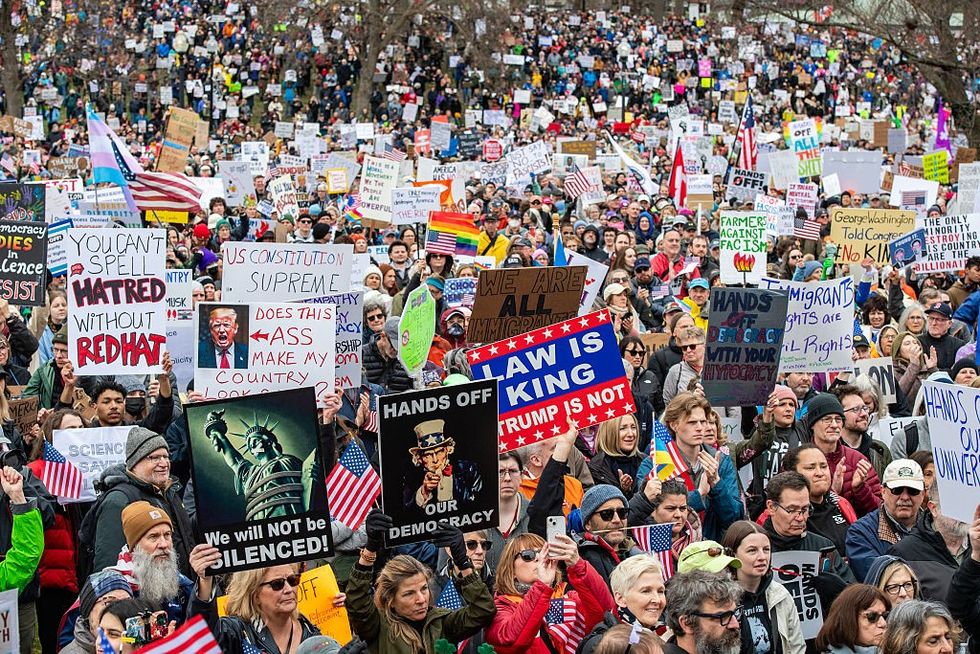
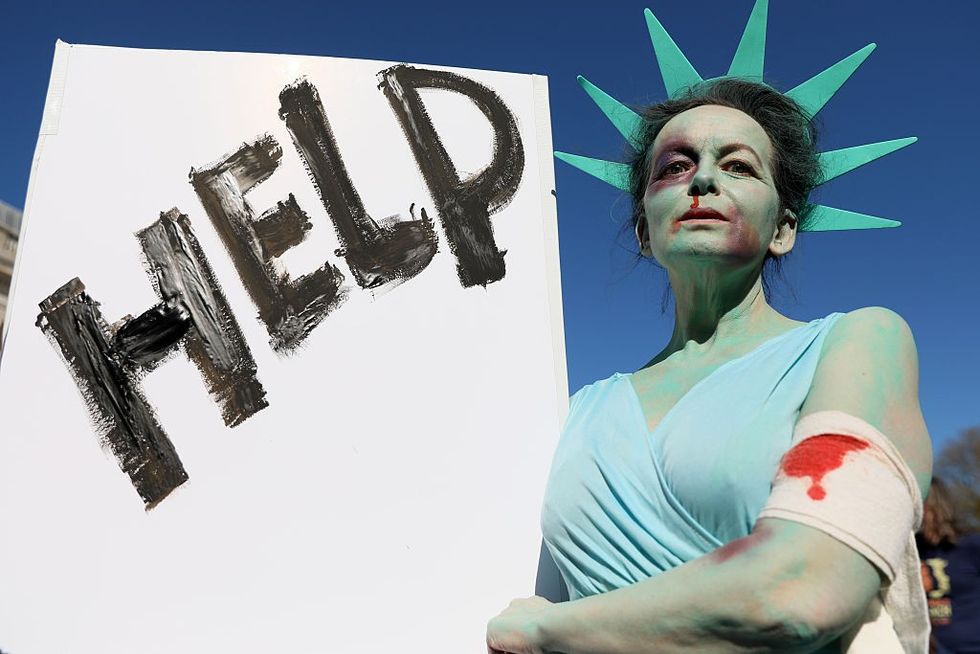
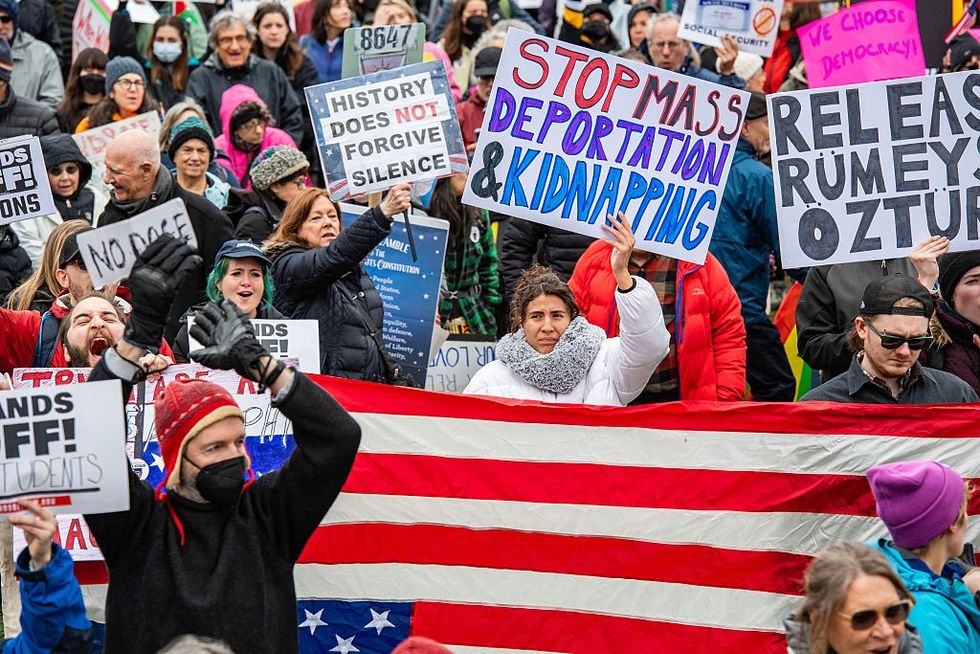
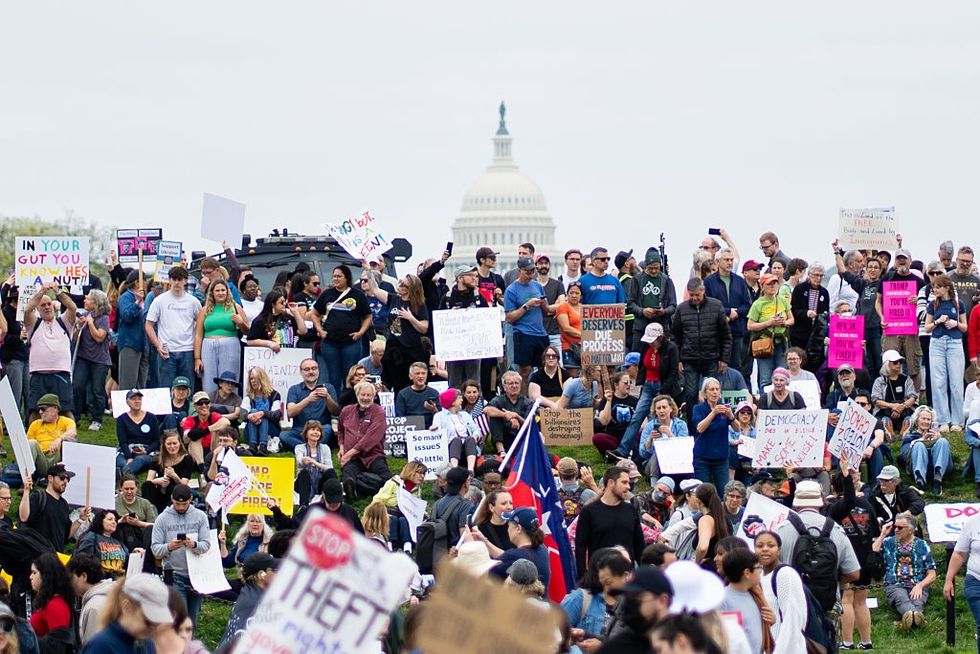
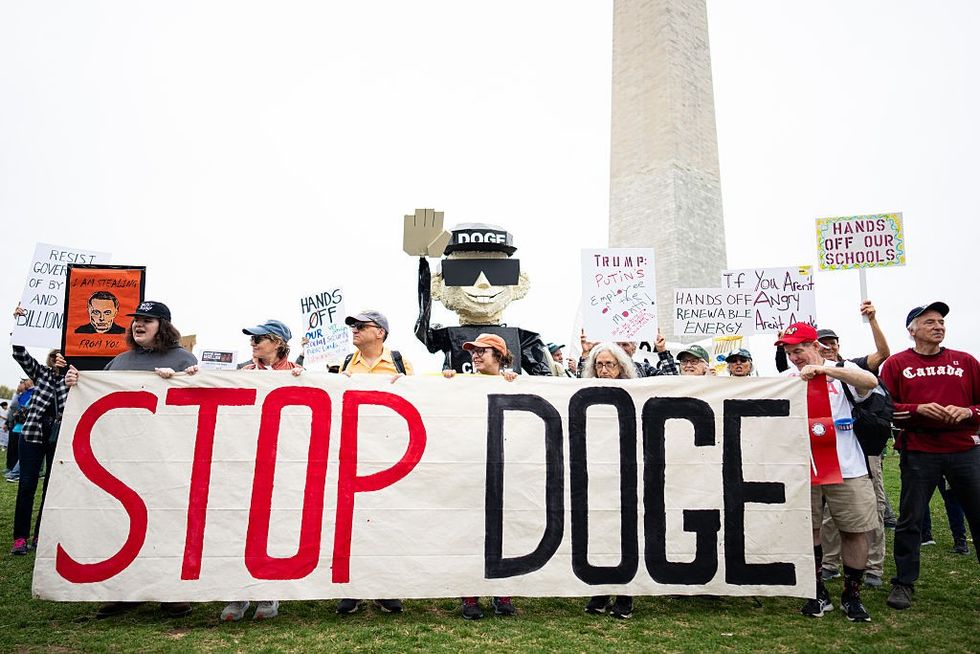
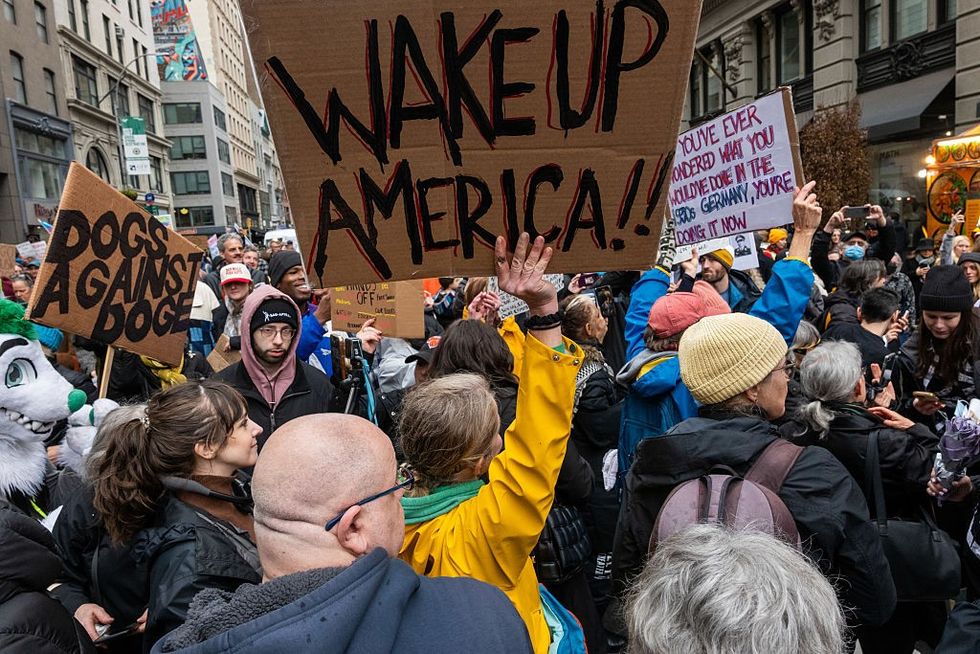
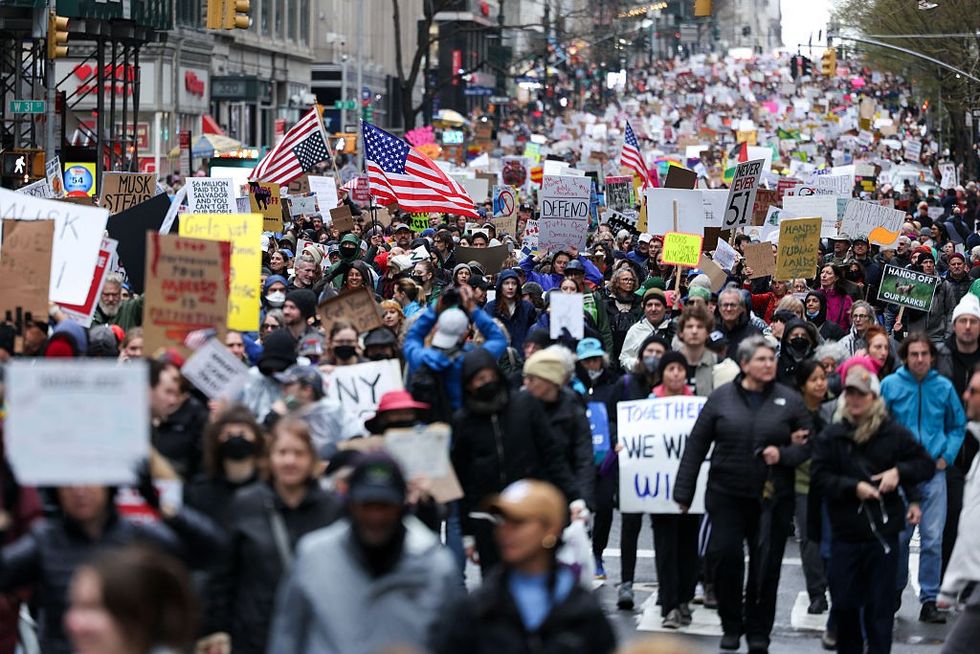

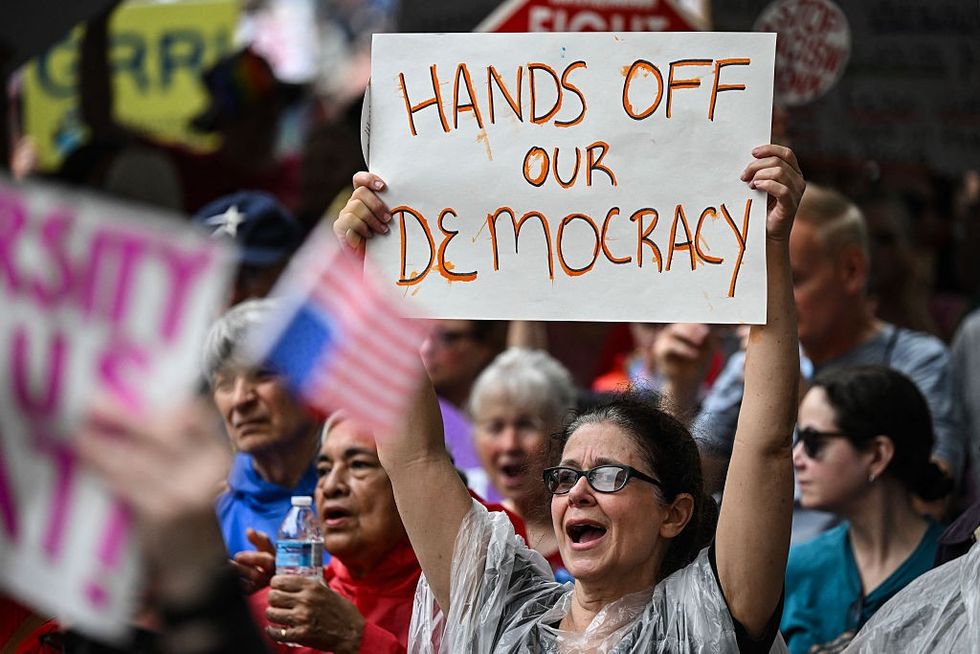
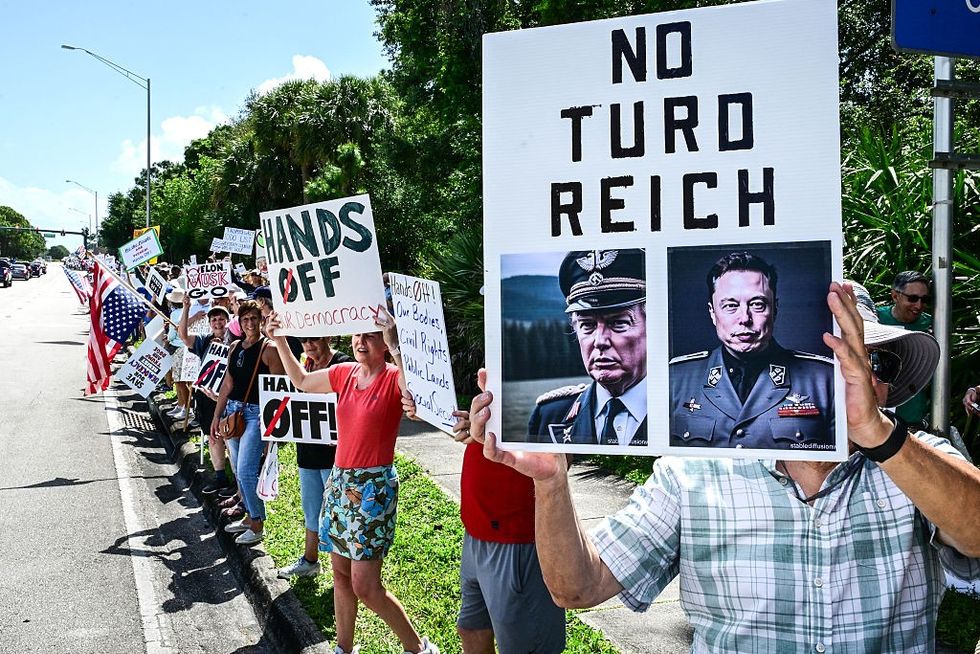
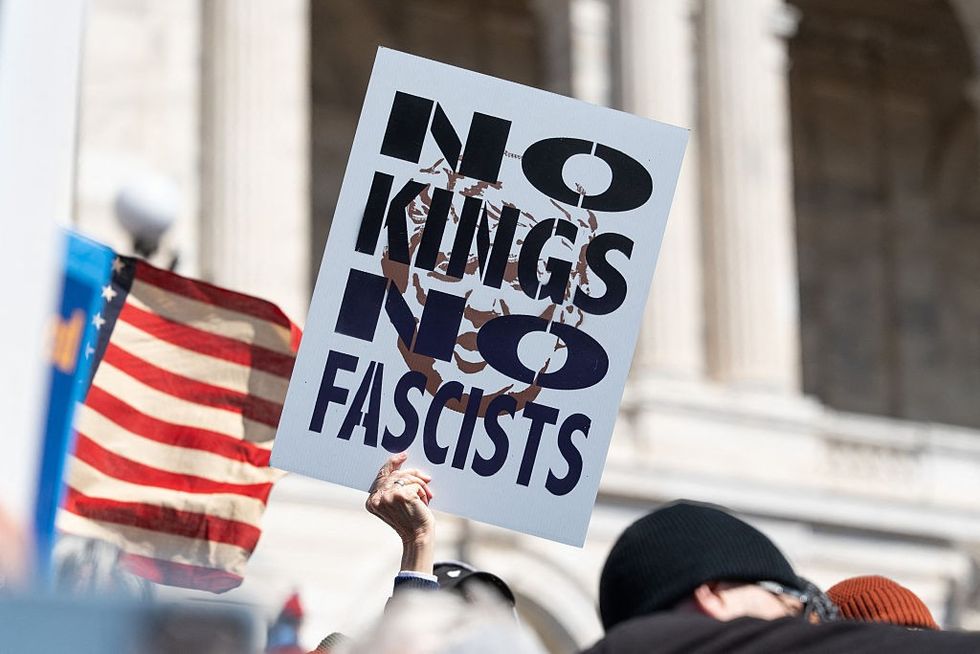
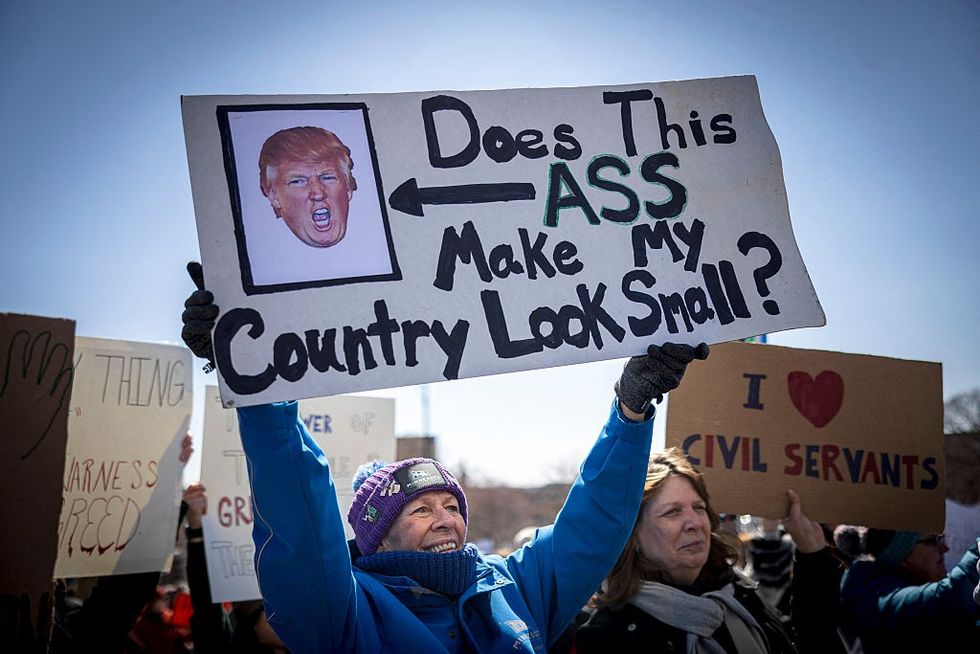
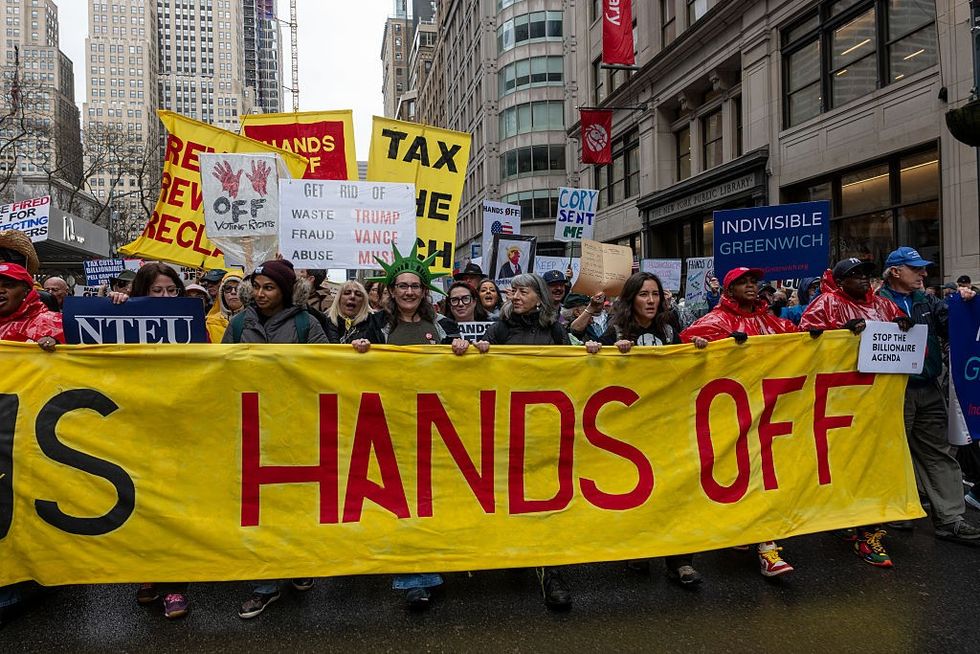
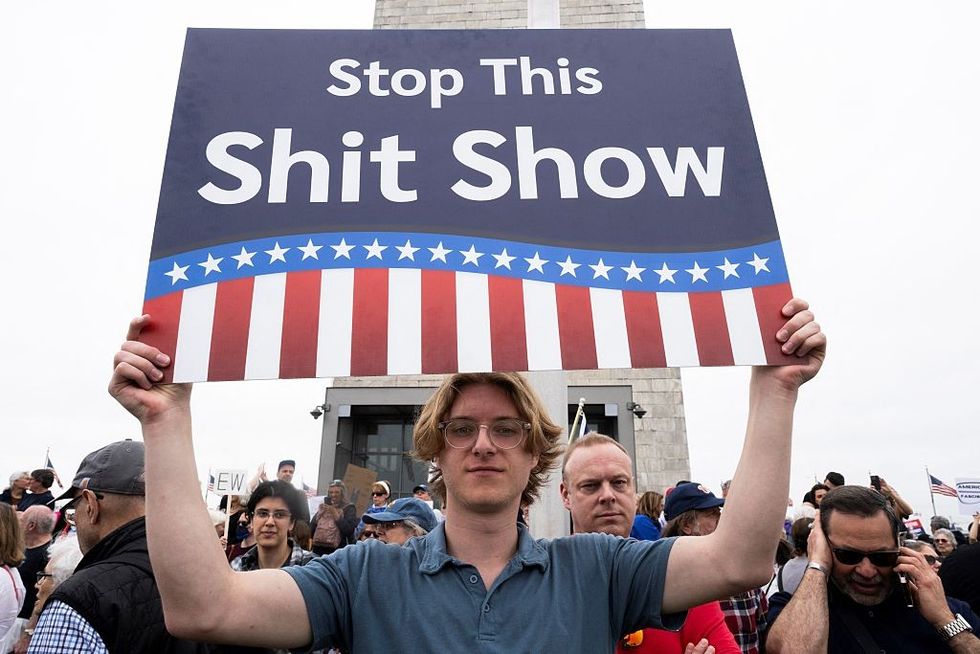
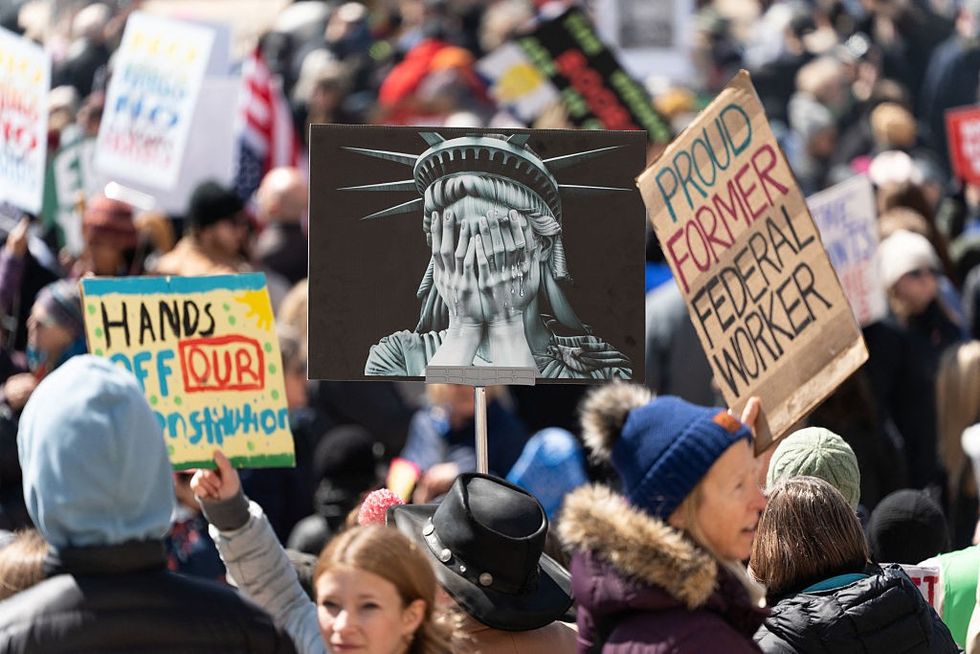
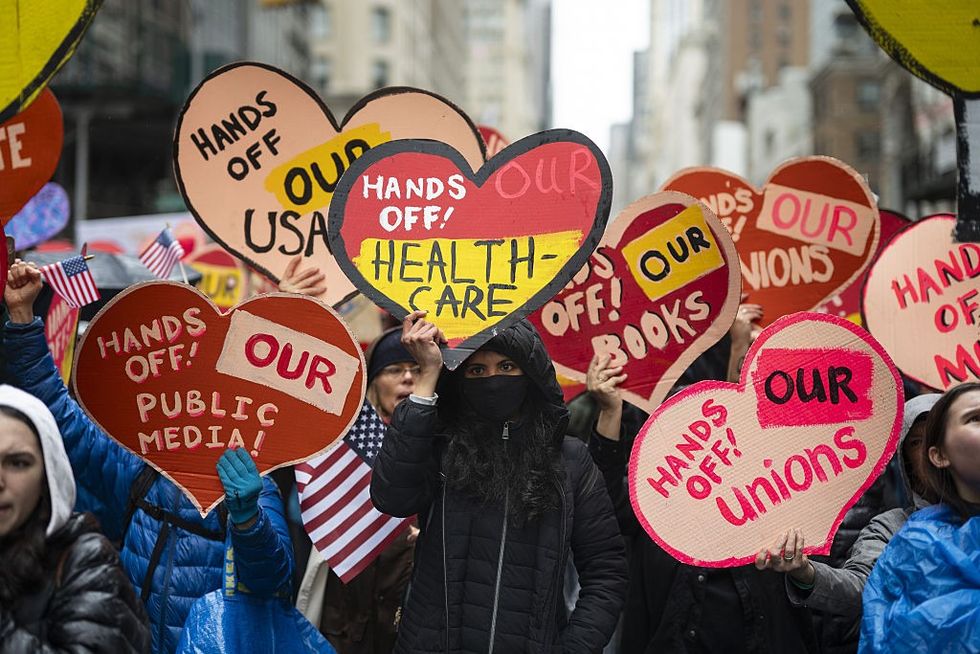
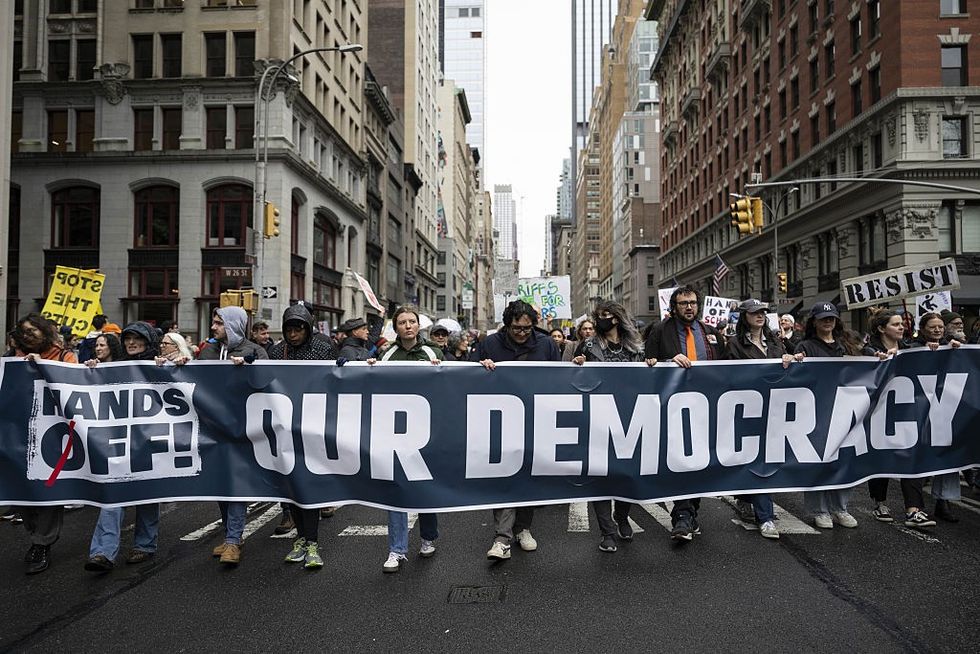
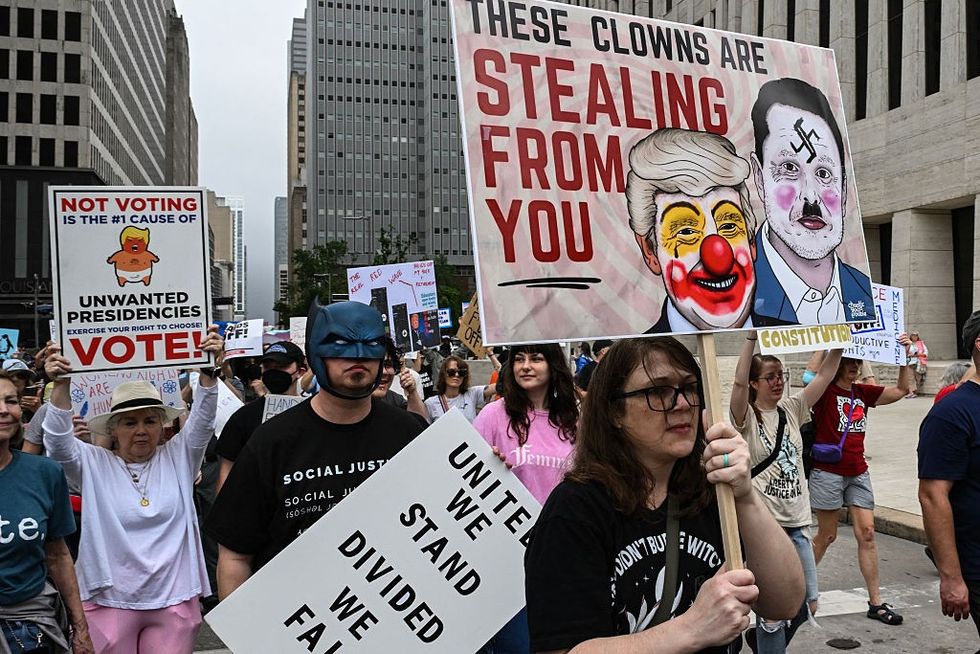
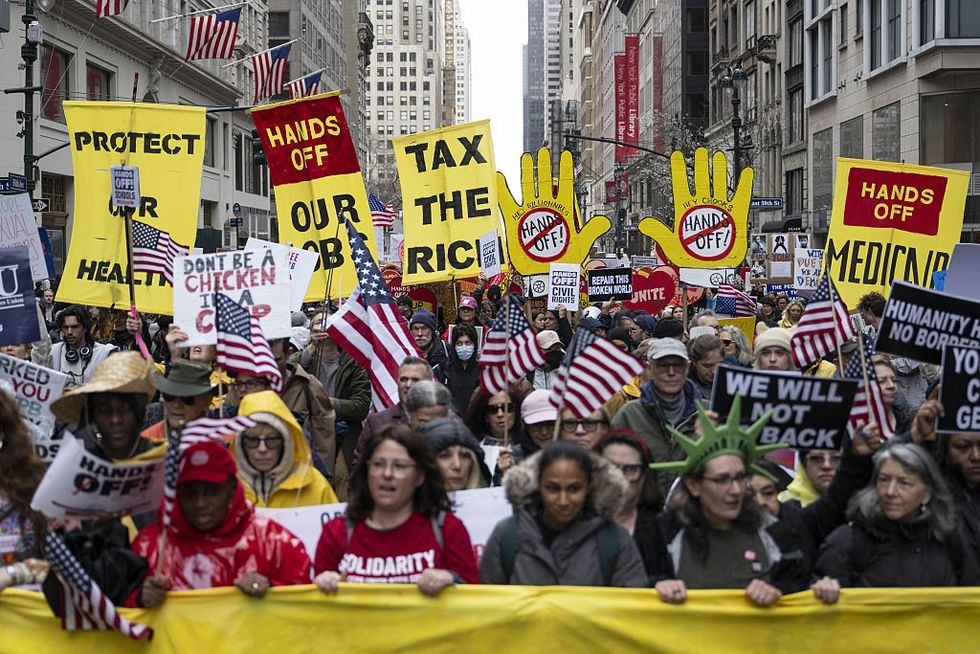
"Everyone involved in this crime against humanity, and everyone who covered it up, would face prosecution in a world that had any shred of dignity left."
A video presented to officials at the United Nations on Friday and first made public Saturday by the New York Times provides more evidence that the recent massacre of Palestinian medics in Gaza did not happen the way Israeli government claimed—the latest in a long line of deception when it comes to violence against civilians that have led to repeated accusations of war crimes.
The video, according to the Palestine Red Crescent Society (PRCS), was found on the phone of a paramedic found in a mass grave with a bullet in his head after being killed, along with seven other medics, by Israeli forces on March 23. The eight medics, buried in the shallow grave with the bodies riddled with bullets, were: Mustafa Khafaja, Ezz El-Din Shaat, Saleh Muammar, Refaat Radwan, Muhammad Bahloul, Ashraf Abu Libda, Muhammad Al-Hila, and Raed Al-Sharif. The video reportedly belonged to Radwan. A ninth medic, identified as Asaad Al-Nasasra, who was at the scene of the massacre, which took place near the southern city of Rafah, is still missing.
The PRCS said it presented the video—which refutes the explanation of the killings offered by Israeli officials—to members of the UN Security Council on Friday.
"They were killed in their uniforms. Driving their clearly marked vehicles. Wearing their gloves. On their way to save lives," Jonathan Whittall, head of the UN's humanitarian affairs office in Palestine, said last week after the bodies were discovered. Some of the victims, according to Gaza officials, were found with handcuffs still on them and appeared to have been shot in the head, execution-style.
The Israeli military initially said its soldiers "did not randomly attack" any ambulances, but rather claimed they fired on "terrorists" who approached them in "suspicious vehicles." Lt. Col. Nadav Shoshani, an IDF spokesperson, said the vehicles that the soldiers opened fire on were driving with their lights off and did not have clearance to be in the area. The video evidence directly contradicts the IDF's version of events.
As the Times reports:
The Times obtained the video from a senior diplomat at the United Nations who asked not to be identified to be able to share sensitive information.
The Times verified the location and timing of the video, which was taken in the southern city of Rafah early on March 23. Filmed from what appears to be the front interior of a moving vehicle, it shows a convoy of ambulances and a fire truck, clearly marked, with headlights and flashing lights turned on, driving south on a road to the north of Rafah in the early morning. The first rays of sun can be seen, and birds are chirping.
In an interview with Drop Site News published Friday, the only known paramedic to survive the attack, Munther Abed, explained that he and his colleagues "were directly and deliberately shot at" by the IDF. "The car is clearly marked with 'Palestinian Red Crescent Society 101.' The car's number was clear and the crews' uniform was clear, so why were we directly shot at? That is the question."
The video's release sparked fresh outrage and demands for accountability on Saturday.
"The IDF denied access to the site for days; they sent in diggers to cover up the massacre and intentionally lied about it," said podcast producer Hamza M. Syed in reaction to the new revelations. "The entire leadership of the Israeli army is implicated in this unconscionable war crime. And they must be prosecuted."
"Everyone involved in this crime against humanity, and everyone who covered it up, would face prosecution in a world that had any shred of dignity left," said journalist Ryan Grim of DropSite News.
"They're dismantling our country. They're looting our government. And they think we'll just watch."
In communities across the United States and also overseas, coordinated "Hands Off" protests are taking place far and wide Saturday in the largest public rebuke yet to President Donald Trump and top henchman Elon Musk's assault on the workings of the federal government and their program of economic sabotage that is sacrificing the needs of working families to authoritarianism and the greed of right-wing oligarchs.
Indivisible, one of the key organizing groups behind the day's protests, said millions participated in more than 1,300 individual rallies as they demanded "an end to Trump's authoritarian power grab" and condemning all those aiding and abetting it.
"We expected hundreds of thousands. But at virtually every single event, the crowds eclipsed our estimates," the group said in a statement Saturday evening.
"Hands off our healthcare, hands off our civil rights, hands off our schools, our freedoms, and our democracy."
"This is the largest day of protest since Trump retook office," the group added. "And in many small towns and cities, activists are reporting the biggest protests their communities have ever seen as everyday people send a clear, unmistakable message to Trump and Musk: Hands off our healthcare, hands off our civil rights, hands off our schools, our freedoms, and our democracy."
According to the organizers' call to action:
They're dismantling our country. They’re looting our government. And they think we'll just watch.
On Saturday, April 5th, we rise up with one demand: Hands Off!
This is a nationwide mobilization to stop the most brazen power grab in modern history. Trump, Musk, and their billionaire cronies are orchestrating an all-out assault on our government, our economy, and our basic rights—enabled by Congress every step of the way. They want to strip America for parts—shuttering Social Security offices, firing essential workers, eliminating consumer protections, and gutting Medicaid—all to bankroll their billionaire tax scam.
They're handing over our tax dollars, our public services, and our democracy to the ultra-rich. If we don't fight now, there won’t be anything left to save.
The more than 1,300 "Hands Off!" demonstrations—organized by a large coalition of unions, progressive advocacy groups, and pro-democracy watchdogs—first kicked off Saturday in Europe, followed by East Coast communities in the U.S., and continued throughout the day at various times, depending on location. See here for a list of scheduled "Hands Off" events.
"The United States has a president, not a king," said the progressive advocacy group People's Action, one of the group's involved in the actions, in an email to supporters Saturday morning just as protest events kicked off in hundreds of cities and communities. "Donald Trump has, by every measure, been working to make himself a king. He has become unanswerable to the courts, Congress, and the American people."
In its Saturday evening statement, Indivisible said the actions far exceeded their expectations and should be seen as a turning point in the battle to stop Trump and his minions:
The Trump administration has spent its first 75 days in office trying to overwhelm us, to make us feel powerless, so that we will fall in line, accept the ransacking of our government, the raiding of our social safety net, and the dismantling of our democracy.
And too often, the response from our leaders and those in positions to resist has been abject cowardice. Compliance. Obeying in advance.
But not today. Today we've demonstrated a different path forward. We've modeled the courage and action that we want to see from our leaders, and showed all those who've been standing on the sidelines who share our values that they are not alone.
Citing the Republican president's thirst for "power and greed," People's Action earlier explained why organized pressure must be built and sustained against the administration, especially at the conclusion of a week in which the global economy was spun into disarray by Trump's tariff announcement, his attack on the rule of law continued, and the twice-elected president admitted he was "not joking" about the possibility of seeking a third term, which is barred by the constitution.
"He is destroying the economy with tariffs in order to pay for the tax cuts he wants to push through to enrich himself and his billionaire buddies," warned People's Action. "He has ordered the government to round up innocent people off of the streets and put them in detention centers without due process because they dared to speak out using their First Amendment rights. And he is not close to being done—by his own admission, he is planning to run for a third term, which the Constitution does not allow."
Live stream of Hands Off rally in Washington, D.C.:
Below are photo or video dispatches from demonstrations around the world on Saturday. Check back for updates...
United Kingdom
France
Germany
Belgium:
Massachusetts:
Maine:
Washington, D.C.:
New York:
Minnesota:
Michigan:
Ohio:
Colorado:
Pennsylvania:
North Carolina:
The protest organizers warn that what Trump and Musk are up to "is not just corruption" and "not just mismanagement," but something far more sinister.
"This is a hostile takeover," they said, but vowed to fight back. "This is the moment where we say NO. No more looting, no more stealing, no more billionaires raiding our government while working people struggle to survive."